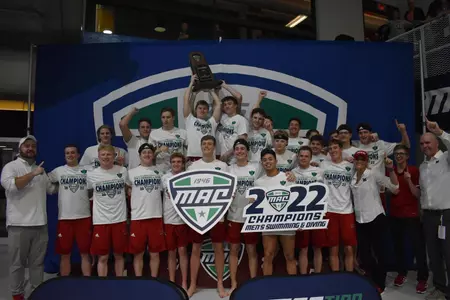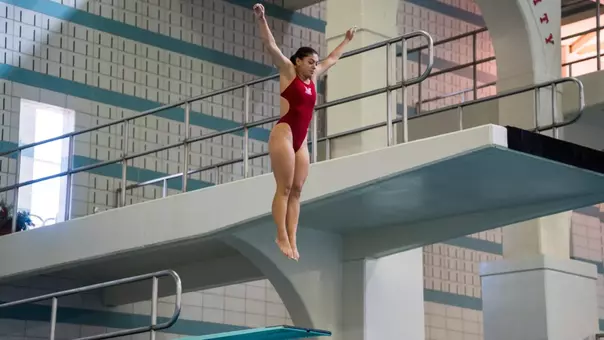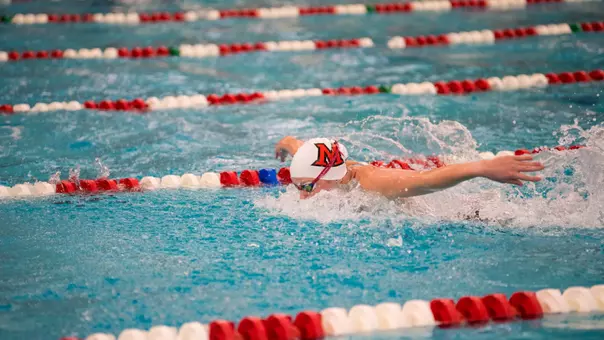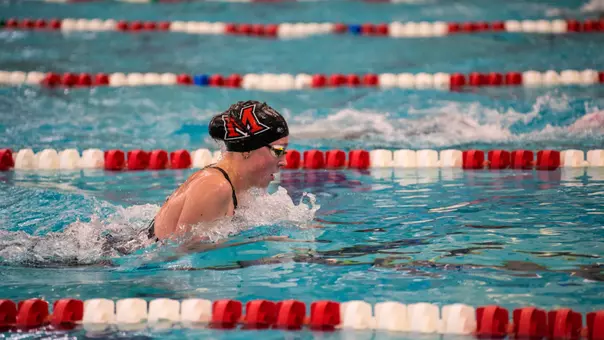Miami Ohio University Athletics

A Back-to-Back Champion: The ABCs of HBC
3/11/2022 4:30:00 PM | Swimming and Diving
Hollie Bonewit-Cron has been breaking through barriers her whole life.
The Miami University head coach of men's and women's swimming and diving has made a career out of jobs that didn't even exist before she arrived.
Georgia Southern created a graduate assistant role for her in 2000 to help launch her coaching career. The University of Florida added an assistant coach position to bring her on staff in 2002. Nova Southeastern had never even had a swimming and diving program before hiring Bonewit-Cron in 2009 to serve as the school's first-ever head coach.
And when Bonewit-Cron took over at Miami in 2016, she became the first coach of the newly-combined RedHawk men's and women's programs, making her the first female coach in Miami men's swim/dive history.
That led to a historic accomplishment for Bonewit-Cron in 2019, as she became the first-ever female coach to lead a men's team to a Mid-American Conference championship in any sport when the RedHawks captured the conference meet.
"I don't ever look at it as 'first female,'" Bonewit-Cron said. "For me, it's just another step in building a program."
Miami took the next step in its program last week, as the RedHawk men's team brought home its second consecutive MAC trophy and third in four years.
The back-to-back championships mark the first time in more than 50 years that Miami has won the event twice in a row; the 1966-67 and 1967-68 squads were the last ones to repeat.
"It's very humbling to know that we got to that point," said Bonewit-Cron. "These athletes did more than I could have ever expected them to do…I really attribute that to the grit this team had all season."
 The RedHawks finished this year's MAC meet with 823 points, nearly 100 ahead of runner-up and host Southern Illinois. Despite a difficult year of uncertainty related to the COVID pandemic –as well as a non-COVID illness that began sweeping through the team during the final few days of competition– Miami persevered to finish in first place and bring home the hardware.
The RedHawks finished this year's MAC meet with 823 points, nearly 100 ahead of runner-up and host Southern Illinois. Despite a difficult year of uncertainty related to the COVID pandemic –as well as a non-COVID illness that began sweeping through the team during the final few days of competition– Miami persevered to finish in first place and bring home the hardware.
"These young men stood up for themselves, but [also] stood up for their teammates, and wanted the championship as much for the person next to them as they did for themselves…that's what builds championships," said Bonewit-Cron.
"The rings are nice. The medals are nice. But to step up and selflessly perform on behalf of the team is really what winning all of this means, at least in my opinion."
Sitting in her office with a view of the Corwin M. Nixon Aquatic Center pool and surrounded by an impressive collection of trophies, Bonewit-Cron spent nearly an hour this week elaborating on a handful of the lessons she's learned so far over a 21-year coaching career, as well as some of the principles she's used as a foundation of her program during the past half dozen seasons in Oxford.
How does a lightly-recruited swimmer out of Athens, Ohio become an NCAA All-American and eventually a championship-level coach? How does one head coach manage to find what motivates 65 different student-athletes on a day-in, day-out basis? Or, perhaps to put the question in broader terms, what makes a successful person successful?
These are questions that Bonewit-Cron, now a three-time MAC Men's Swimming Coach of the Year, has spent a good bit of time thinking about through the years. She often gets emails from coaches, some male and some female, looking for advice about how to build a team or lead a program. She said she's more than glad to listen and exchange ideas.
"I say, 'Well, let's do this together…How can we get you on your journey to be at a level that you aspire to?," Bonewit-Cron said. "I think everyone deserves to be heard and to have a conversation like that. I never put myself on any greater level than anybody else. I still have so much to learn from other people…[but] it's pretty cool to be in a position like that."
Here are a few key concepts Bonewit-Cron shared, in her own words.
Some ABCs from HBC, if you will.
AUTHENTICITY
"One of the best pieces of advice I ever got is: In any situation, be myself," said Bonewit-Cron. "Jeremy Foley, the former athletic director at Florida, told me that. When I interviewed here, I said, 'Can you give me some tips?' He said, 'You've got to be yourself. If they don't want you, they're not going to take you. But if you're yourself and they accept you and they want you there, then they know what they're getting and you know what you're getting.'
"Be honest and authentic…that's what I use with the athletes. You're going to get the real me; you're not going to get a fake me. I'm not going to be your best friend, but I'm going to be the mentor that you need, not necessarily the friend that you want."
"She's very authentic. I think that's her style, and I love it," said sophomore swimmer and All-MAC First Team honoree Owen Blazer. "It's definitely a tough love. You know she wants what's best for you, even if you don't know that right there in the moment.
"Everything is a lesson —both good and bad— and she really does a good job of teaching those lessons, whether it's in the pool, in the middle of a set, or in her office."
BALANCE
Bonewit-Cron and her husband Chad have three young children: two grade-school daughters and a two-year-old son. Chad Cron works during the week in another state, and with Bonewit-Cron's Miami responsibilities, finding the perfect balance between her roles of mother and coach is critical.
"Some people look at me and they're like, 'How do you do it? You have three young kids!'", Bonewit-Cron laughed. "I sometimes shake my head, like 'How do we do this?'
"It takes a lot of help from reinforcements, like babysitters. But if there's one thing I want to teach my children, it's that they can achieve what they set out to do.
"When my husband got a job in Chicago, we had the conversation of me moving with him. He and I had long conversations and came to that agreement, after I said, 'I don't think my professional success should be at a detriment to our family's success.'
"He respects my success and I respect his. It's no different than me not telling him to not take that job. He and I came to that conclusion, that I should not have to leave my job either to make our family unit work.
"That's something that I love being able to talk to other people about, especially female coaches. You can have the family, and you can have your success, but so much communication has to occur in order to get to that point. That's something that I hope I can help other people with."
For Bonewit-Cron, that balance means trying to keep her personal and professional worlds separate as much as possible, and making a conscious effort not to take her work home when it's time to be 'Mom.'
"I need to have that time for my family," she said. "They do come to my meets, so they get [to be] involved that way.
"Last year, when we won a championship, we jumped in the water…then when my oldest daughter's swim team won a summer league championship, it was at a completely different level, but that's a big deal to her.
"They won, they got to jump in the water, and the first thing she said when she got out was, 'Mommy, I got to jump in the water like you!' It's so cool that they're always watching, they're always seeing, and that's something that I want to show them: You can do it, and you can achieve things.
"I hope that's resonating."
COMMITMENT
Bonewit-Cron grew up watching her older brother excel in the pool; the siblings were born seven years apart to the day, and Rob Bonewit became one of the top high school butterflyers in the country before signing with perennial NCAA power Florida. Hollie did not initially have the same level of success as her brother, and was only recruited by two universities' swimming programs, ultimately choosing to join the hometown Ohio Bobcats.
"Long story short: I wasn't that good in high school," Bonewit-Cron recalled. But during her time in college, something clicked. Bonewit-Cron graduated as a 17-time MAC champion, an NCAA All-American and an Olympic Trials qualifier, with a handful of school and conference records to her name (as well as a MAC team title).
 When asked what helps a swimmer make that type of improvement over the course of their career, she didn't hesitate.
When asked what helps a swimmer make that type of improvement over the course of their career, she didn't hesitate.
"Commitment."
"Anyone can have a goal," Bonewit-Cron continued. "Anyone can walk into my office and say, 'I want to go to the Olympics.'" (She would know, having served as the Grenada swim coach at the 2012 Games in London.)
"But you've got to have that commitment, and that commitment needs to be an everyday championship lifestyle," said Bonewit-Cron.
"Getting a lot of these kids to achieve the goals that they want to achieve? There are athletes that don't see it that way, and that's something that we try to mentor them to realize. Yes, we can work them harder, but I think we're doing our job and they're training. So it's really just their commitment level, not only physically, but mentally when they come to practice every day.
"That's why [current RedHawk and NCAA qualifier] Nicole Maier is where she's at now. Every day she comes to practice, she doesn't take a day off from training hard and going the best that she can be.
"That is the commitment level that you have to make to get better."
DISCIPLINE
Bonewit-Cron often says, "If you are disciplined, you won't need to be disciplined."
As someone who remembers being academically ineligible for a portion of her first year as a collegian, without some of the same academic resources and support staff today's student-athletes have, she makes sure to help her swimmers and divers understand the importance of putting their priorities in the right place.
"Chemistry, calculus and philosophy my first quarter – it was eight to 10 weeks of just kicking me in the teeth," Bonewit-Cron said. "Now what I communicate to our recruits and our current student-athletes is an upside-down triangle. At the two top points are your academics and athletics. At the bottom point is your social life.
"Sure, it's college: You can have a social life. But it can't be a priority. Once you invert that triangle or you change it —maybe you have athletics and social life at the top— your academics will start to plummet.
"I try to explain that to them. They seemingly understand it and get it. Our team GPA has been one of the best in history, so I feel pretty good about that, but it's a day-to-day, constant reminder.
"In the back of my head, inevitably, when I have an athlete who's struggling, it does bring back those memories: 'Hey, don't make the same mistakes I did.'"
EXPECTATIONS
Legendary coach John Wooden was famous for his Pyramid of Success. If Bonewit-Cron were to design her own version of that diagram for the Miami swim/dive team, the foundational element would be 'expectations.' It's one of the things that she realized early on as a mom that applies perfectly to coaching.
"I learned as a parent that you have to continually remind your student-athletes (and my own children) of your expectations," said Bonewit-Cron. "You cannot expect people to meet your expectations until you've told them your expectations.
"If my athletes don't know my expectations, and then they don't meet the expectations, how can I be upset with them if I haven't told them?"
A culture built on discipline and expectations allows Bonewit-Cron to hold her student-athletes accountable to the high standards she's set. "There are ways you can discipline athletes to let them know that you trust and respect them, but these are the consequences of their behaviors, when it's something that they've already known the established expectation and they haven't met it," she said.
Blazer said one of the big expectations Bonewit-Cron and her staff have for their student-athletes is to be engaged every day at practice, not just physically present.
And even after a difficult event or a disappointing result, the Miami coach is always challenging her swimmers and divers to focus on the next task at hand.
"She's never going to really feel bad for you," Blazer said. "A lot of times if something [tough] happens —you get sick at a meet, or you have a bad swim— when you come over there, she's always like, 'I don't want to see puppy eyes, because I'm not going to give you any sympathy. It's time to move on to the next one.' It's one swim, or one bad practice, whatever it may be.
"She's just one of those people who really doesn't like to dwell on those things, and I think that's what has allowed her to be so successful as both a swimmer and now a coach."
FEEL
Bonewit-Cron graduated from Ohio with a psychology degree and later earned her master's in kinesiology with a sport psychology emphasis at Georgia Southern. Her sport psychology background makes a difference as she tries to lead a large team of male and female student-athletes.
"I think most of it boils down to having a feel for the athletes and learning their calls and tells during the year," said Bonewit-Cron. "They're not just a number. They're not just a member on this team. They're a valuable person who's going to contribute a lot, but you have to tap into what really motivates them."
 There are some athletes Bonewit-Cron says that she literally has had a conversation with every single day at the pool for four years. And while that may be impossible with more than five dozen people on the men's and women's teams, she is still intentional about connecting with each person on an individual basis, whatever that might look like.
There are some athletes Bonewit-Cron says that she literally has had a conversation with every single day at the pool for four years. And while that may be impossible with more than five dozen people on the men's and women's teams, she is still intentional about connecting with each person on an individual basis, whatever that might look like.
"Giving everyone attention is not hard to do. Even just a fist bump when they walk by. They know I'm paying attention, and they know I care. I watch their demeanors, and I know when an athlete's not having a good day. Even with 65 athletes, I know when they're kind of off kilter…
"Understanding student-athletes on a micro- and macro- level, I think, is one of the best things I've been able to do in applying that sport psychology background to my coaching."
GRIT
"I want people from the outside to see that, win or lose, you're going to get our best effort, and you're going to see a level of drive and motivation that honors the Miami program and the RedHawk tradition," Bonewit-Cron said as she glanced across the pool at the Red and White's championship banners hanging proudly from the rafters.
"I look at those boards all the time with those championships. I see what the women have done, and we are at a level right now where I think our women are on the cusp of bringing some of those championships back to Miami," she said. (The RedHawks finished third at this year's MAC meet.) "On the men's side, we're continuing to build what these past coaches have built…
"It's about attitude and effort. My husband and I talk to our own kids about this; we talk about the 'A&E' all the time: Having a good attitude and having the best effort you can give…
"I think we have a strong value system on our team, and I think that's something that shows in our performances, whether you're in the pool swimming, or whether you're on the boards diving.
"I got my kids in the car today to take them to the bus stop, and I said, 'Girls, do we have a good attitude?'
"My younger daughter says, 'Yeah. I left my bad attitude in the house!'
"That's awesome. I will take it," Bonewit-Cron smiled.
WHAT'S NEXT
No Miami men's swim/dive team has ever won three straight MAC championships. Bonewit-Cron is well aware of this fact, though she doesn't plan to make a big deal of it with her student-athletes.
"I really just want to put a focus on winning as many events as we can and placing as many athletes in the top eight, coming back at night [for finals], as we can. I don't even know if I'm going to mention a three-peat to these guys," she said. "I think we'll just take it for face value and see what we can achieve, not only at a MAC level, but also at an NCAA level."
With Bonewit-Cron, it's always about the next step, and just taking one step at a time.
If another barrier happens to fall on the way, or if there's even more history to be made, so be it.
After all, there had never been a female coach to lead a men's team to a MAC title…until HBC did it in 2019.
Then, there had never been a female coach to lead a men's team to two straight MAC titles…until HBC did it this month.
And so while there has never been a female coach to lead a men's team to three straight MAC titles…check back in a year or so, and that may have changed too.
That would be the logical 'next step', right?
"I think she's just very proud of what she's been able to accomplish so far as a coach," said Blazer. "She realizes that, man or woman, if you have that drive and that belief in yourself, the sky's the limit.
"She figured that out, and now she's being a groundbreaker for women in coaching roles; I think that's awesome. She's taking advantage of what she's been given, and she just believes in herself and the people around her. That's really what it comes down to."
Being a trailblazer can be difficult. Bonewit-Cron will be the first to tell you that her career hasn't been all 'rainbows and butterflies.' But the results so far have made every step of the journey worth it.
So maybe it hasn't been as easy as A-B-C.
But it's been a success for HBC.
Find more Front Row Features at MiamiRedHawks.com/FrontRowFeatures.
The Miami University head coach of men's and women's swimming and diving has made a career out of jobs that didn't even exist before she arrived.
Georgia Southern created a graduate assistant role for her in 2000 to help launch her coaching career. The University of Florida added an assistant coach position to bring her on staff in 2002. Nova Southeastern had never even had a swimming and diving program before hiring Bonewit-Cron in 2009 to serve as the school's first-ever head coach.
And when Bonewit-Cron took over at Miami in 2016, she became the first coach of the newly-combined RedHawk men's and women's programs, making her the first female coach in Miami men's swim/dive history.
That led to a historic accomplishment for Bonewit-Cron in 2019, as she became the first-ever female coach to lead a men's team to a Mid-American Conference championship in any sport when the RedHawks captured the conference meet.
"I don't ever look at it as 'first female,'" Bonewit-Cron said. "For me, it's just another step in building a program."
Miami took the next step in its program last week, as the RedHawk men's team brought home its second consecutive MAC trophy and third in four years.
The back-to-back championships mark the first time in more than 50 years that Miami has won the event twice in a row; the 1966-67 and 1967-68 squads were the last ones to repeat.
"It's very humbling to know that we got to that point," said Bonewit-Cron. "These athletes did more than I could have ever expected them to do…I really attribute that to the grit this team had all season."
 The RedHawks finished this year's MAC meet with 823 points, nearly 100 ahead of runner-up and host Southern Illinois. Despite a difficult year of uncertainty related to the COVID pandemic –as well as a non-COVID illness that began sweeping through the team during the final few days of competition– Miami persevered to finish in first place and bring home the hardware.
The RedHawks finished this year's MAC meet with 823 points, nearly 100 ahead of runner-up and host Southern Illinois. Despite a difficult year of uncertainty related to the COVID pandemic –as well as a non-COVID illness that began sweeping through the team during the final few days of competition– Miami persevered to finish in first place and bring home the hardware."These young men stood up for themselves, but [also] stood up for their teammates, and wanted the championship as much for the person next to them as they did for themselves…that's what builds championships," said Bonewit-Cron.
"The rings are nice. The medals are nice. But to step up and selflessly perform on behalf of the team is really what winning all of this means, at least in my opinion."
Sitting in her office with a view of the Corwin M. Nixon Aquatic Center pool and surrounded by an impressive collection of trophies, Bonewit-Cron spent nearly an hour this week elaborating on a handful of the lessons she's learned so far over a 21-year coaching career, as well as some of the principles she's used as a foundation of her program during the past half dozen seasons in Oxford.
How does a lightly-recruited swimmer out of Athens, Ohio become an NCAA All-American and eventually a championship-level coach? How does one head coach manage to find what motivates 65 different student-athletes on a day-in, day-out basis? Or, perhaps to put the question in broader terms, what makes a successful person successful?
These are questions that Bonewit-Cron, now a three-time MAC Men's Swimming Coach of the Year, has spent a good bit of time thinking about through the years. She often gets emails from coaches, some male and some female, looking for advice about how to build a team or lead a program. She said she's more than glad to listen and exchange ideas.
"I say, 'Well, let's do this together…How can we get you on your journey to be at a level that you aspire to?," Bonewit-Cron said. "I think everyone deserves to be heard and to have a conversation like that. I never put myself on any greater level than anybody else. I still have so much to learn from other people…[but] it's pretty cool to be in a position like that."
Here are a few key concepts Bonewit-Cron shared, in her own words.
Some ABCs from HBC, if you will.
AUTHENTICITY
"One of the best pieces of advice I ever got is: In any situation, be myself," said Bonewit-Cron. "Jeremy Foley, the former athletic director at Florida, told me that. When I interviewed here, I said, 'Can you give me some tips?' He said, 'You've got to be yourself. If they don't want you, they're not going to take you. But if you're yourself and they accept you and they want you there, then they know what they're getting and you know what you're getting.'
"Be honest and authentic…that's what I use with the athletes. You're going to get the real me; you're not going to get a fake me. I'm not going to be your best friend, but I'm going to be the mentor that you need, not necessarily the friend that you want."
"She's very authentic. I think that's her style, and I love it," said sophomore swimmer and All-MAC First Team honoree Owen Blazer. "It's definitely a tough love. You know she wants what's best for you, even if you don't know that right there in the moment.
"Everything is a lesson —both good and bad— and she really does a good job of teaching those lessons, whether it's in the pool, in the middle of a set, or in her office."
BALANCE
Bonewit-Cron and her husband Chad have three young children: two grade-school daughters and a two-year-old son. Chad Cron works during the week in another state, and with Bonewit-Cron's Miami responsibilities, finding the perfect balance between her roles of mother and coach is critical.
"Some people look at me and they're like, 'How do you do it? You have three young kids!'", Bonewit-Cron laughed. "I sometimes shake my head, like 'How do we do this?'
"It takes a lot of help from reinforcements, like babysitters. But if there's one thing I want to teach my children, it's that they can achieve what they set out to do.
"When my husband got a job in Chicago, we had the conversation of me moving with him. He and I had long conversations and came to that agreement, after I said, 'I don't think my professional success should be at a detriment to our family's success.'
"He respects my success and I respect his. It's no different than me not telling him to not take that job. He and I came to that conclusion, that I should not have to leave my job either to make our family unit work.
"That's something that I love being able to talk to other people about, especially female coaches. You can have the family, and you can have your success, but so much communication has to occur in order to get to that point. That's something that I hope I can help other people with."
For Bonewit-Cron, that balance means trying to keep her personal and professional worlds separate as much as possible, and making a conscious effort not to take her work home when it's time to be 'Mom.'
"I need to have that time for my family," she said. "They do come to my meets, so they get [to be] involved that way.
"Last year, when we won a championship, we jumped in the water…then when my oldest daughter's swim team won a summer league championship, it was at a completely different level, but that's a big deal to her.
"They won, they got to jump in the water, and the first thing she said when she got out was, 'Mommy, I got to jump in the water like you!' It's so cool that they're always watching, they're always seeing, and that's something that I want to show them: You can do it, and you can achieve things.
"I hope that's resonating."
COMMITMENT
Bonewit-Cron grew up watching her older brother excel in the pool; the siblings were born seven years apart to the day, and Rob Bonewit became one of the top high school butterflyers in the country before signing with perennial NCAA power Florida. Hollie did not initially have the same level of success as her brother, and was only recruited by two universities' swimming programs, ultimately choosing to join the hometown Ohio Bobcats.
"Long story short: I wasn't that good in high school," Bonewit-Cron recalled. But during her time in college, something clicked. Bonewit-Cron graduated as a 17-time MAC champion, an NCAA All-American and an Olympic Trials qualifier, with a handful of school and conference records to her name (as well as a MAC team title).
 When asked what helps a swimmer make that type of improvement over the course of their career, she didn't hesitate.
When asked what helps a swimmer make that type of improvement over the course of their career, she didn't hesitate."Commitment."
"Anyone can have a goal," Bonewit-Cron continued. "Anyone can walk into my office and say, 'I want to go to the Olympics.'" (She would know, having served as the Grenada swim coach at the 2012 Games in London.)
"But you've got to have that commitment, and that commitment needs to be an everyday championship lifestyle," said Bonewit-Cron.
"Getting a lot of these kids to achieve the goals that they want to achieve? There are athletes that don't see it that way, and that's something that we try to mentor them to realize. Yes, we can work them harder, but I think we're doing our job and they're training. So it's really just their commitment level, not only physically, but mentally when they come to practice every day.
"That's why [current RedHawk and NCAA qualifier] Nicole Maier is where she's at now. Every day she comes to practice, she doesn't take a day off from training hard and going the best that she can be.
"That is the commitment level that you have to make to get better."
DISCIPLINE
Bonewit-Cron often says, "If you are disciplined, you won't need to be disciplined."
As someone who remembers being academically ineligible for a portion of her first year as a collegian, without some of the same academic resources and support staff today's student-athletes have, she makes sure to help her swimmers and divers understand the importance of putting their priorities in the right place.
"Chemistry, calculus and philosophy my first quarter – it was eight to 10 weeks of just kicking me in the teeth," Bonewit-Cron said. "Now what I communicate to our recruits and our current student-athletes is an upside-down triangle. At the two top points are your academics and athletics. At the bottom point is your social life.
"Sure, it's college: You can have a social life. But it can't be a priority. Once you invert that triangle or you change it —maybe you have athletics and social life at the top— your academics will start to plummet.
"I try to explain that to them. They seemingly understand it and get it. Our team GPA has been one of the best in history, so I feel pretty good about that, but it's a day-to-day, constant reminder.
"In the back of my head, inevitably, when I have an athlete who's struggling, it does bring back those memories: 'Hey, don't make the same mistakes I did.'"
EXPECTATIONS
Legendary coach John Wooden was famous for his Pyramid of Success. If Bonewit-Cron were to design her own version of that diagram for the Miami swim/dive team, the foundational element would be 'expectations.' It's one of the things that she realized early on as a mom that applies perfectly to coaching.
"I learned as a parent that you have to continually remind your student-athletes (and my own children) of your expectations," said Bonewit-Cron. "You cannot expect people to meet your expectations until you've told them your expectations.
"If my athletes don't know my expectations, and then they don't meet the expectations, how can I be upset with them if I haven't told them?"
A culture built on discipline and expectations allows Bonewit-Cron to hold her student-athletes accountable to the high standards she's set. "There are ways you can discipline athletes to let them know that you trust and respect them, but these are the consequences of their behaviors, when it's something that they've already known the established expectation and they haven't met it," she said.
Blazer said one of the big expectations Bonewit-Cron and her staff have for their student-athletes is to be engaged every day at practice, not just physically present.
And even after a difficult event or a disappointing result, the Miami coach is always challenging her swimmers and divers to focus on the next task at hand.
"She's never going to really feel bad for you," Blazer said. "A lot of times if something [tough] happens —you get sick at a meet, or you have a bad swim— when you come over there, she's always like, 'I don't want to see puppy eyes, because I'm not going to give you any sympathy. It's time to move on to the next one.' It's one swim, or one bad practice, whatever it may be.
"She's just one of those people who really doesn't like to dwell on those things, and I think that's what has allowed her to be so successful as both a swimmer and now a coach."
FEEL
Bonewit-Cron graduated from Ohio with a psychology degree and later earned her master's in kinesiology with a sport psychology emphasis at Georgia Southern. Her sport psychology background makes a difference as she tries to lead a large team of male and female student-athletes.
"I think most of it boils down to having a feel for the athletes and learning their calls and tells during the year," said Bonewit-Cron. "They're not just a number. They're not just a member on this team. They're a valuable person who's going to contribute a lot, but you have to tap into what really motivates them."
 There are some athletes Bonewit-Cron says that she literally has had a conversation with every single day at the pool for four years. And while that may be impossible with more than five dozen people on the men's and women's teams, she is still intentional about connecting with each person on an individual basis, whatever that might look like.
There are some athletes Bonewit-Cron says that she literally has had a conversation with every single day at the pool for four years. And while that may be impossible with more than five dozen people on the men's and women's teams, she is still intentional about connecting with each person on an individual basis, whatever that might look like."Giving everyone attention is not hard to do. Even just a fist bump when they walk by. They know I'm paying attention, and they know I care. I watch their demeanors, and I know when an athlete's not having a good day. Even with 65 athletes, I know when they're kind of off kilter…
"Understanding student-athletes on a micro- and macro- level, I think, is one of the best things I've been able to do in applying that sport psychology background to my coaching."
GRIT
"I want people from the outside to see that, win or lose, you're going to get our best effort, and you're going to see a level of drive and motivation that honors the Miami program and the RedHawk tradition," Bonewit-Cron said as she glanced across the pool at the Red and White's championship banners hanging proudly from the rafters.
"I look at those boards all the time with those championships. I see what the women have done, and we are at a level right now where I think our women are on the cusp of bringing some of those championships back to Miami," she said. (The RedHawks finished third at this year's MAC meet.) "On the men's side, we're continuing to build what these past coaches have built…
"It's about attitude and effort. My husband and I talk to our own kids about this; we talk about the 'A&E' all the time: Having a good attitude and having the best effort you can give…
"I think we have a strong value system on our team, and I think that's something that shows in our performances, whether you're in the pool swimming, or whether you're on the boards diving.
"I got my kids in the car today to take them to the bus stop, and I said, 'Girls, do we have a good attitude?'
"My younger daughter says, 'Yeah. I left my bad attitude in the house!'
"That's awesome. I will take it," Bonewit-Cron smiled.
WHAT'S NEXT
No Miami men's swim/dive team has ever won three straight MAC championships. Bonewit-Cron is well aware of this fact, though she doesn't plan to make a big deal of it with her student-athletes.
"I really just want to put a focus on winning as many events as we can and placing as many athletes in the top eight, coming back at night [for finals], as we can. I don't even know if I'm going to mention a three-peat to these guys," she said. "I think we'll just take it for face value and see what we can achieve, not only at a MAC level, but also at an NCAA level."
With Bonewit-Cron, it's always about the next step, and just taking one step at a time.
If another barrier happens to fall on the way, or if there's even more history to be made, so be it.
After all, there had never been a female coach to lead a men's team to a MAC title…until HBC did it in 2019.
Then, there had never been a female coach to lead a men's team to two straight MAC titles…until HBC did it this month.
And so while there has never been a female coach to lead a men's team to three straight MAC titles…check back in a year or so, and that may have changed too.
That would be the logical 'next step', right?
"I think she's just very proud of what she's been able to accomplish so far as a coach," said Blazer. "She realizes that, man or woman, if you have that drive and that belief in yourself, the sky's the limit.
"She figured that out, and now she's being a groundbreaker for women in coaching roles; I think that's awesome. She's taking advantage of what she's been given, and she just believes in herself and the people around her. That's really what it comes down to."
Being a trailblazer can be difficult. Bonewit-Cron will be the first to tell you that her career hasn't been all 'rainbows and butterflies.' But the results so far have made every step of the journey worth it.
So maybe it hasn't been as easy as A-B-C.
But it's been a success for HBC.
Find more Front Row Features at MiamiRedHawks.com/FrontRowFeatures.
Players Mentioned
RedHawk Rewind Episode 22: David Sayler
Tuesday, February 17
Player Spotlight - Presley Hosick
Tuesday, February 17
Miami Hockey Head Coach Anthony Noreen 2-14 Postgame
Sunday, February 15
Highlights: Miami Men's Basketball vs Ohio 2-14
Saturday, February 14






